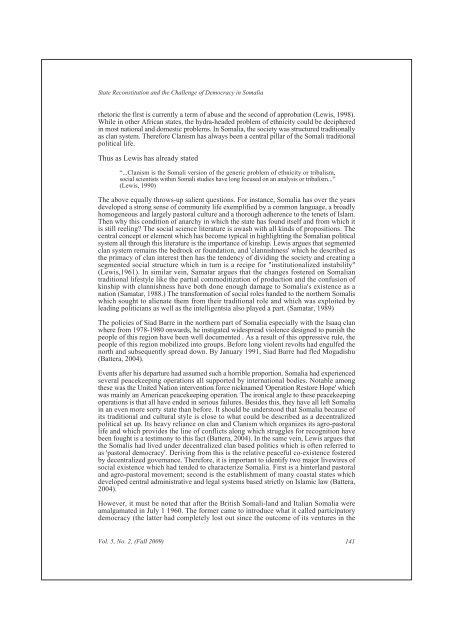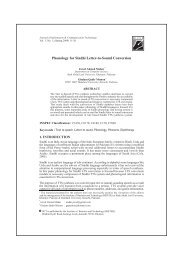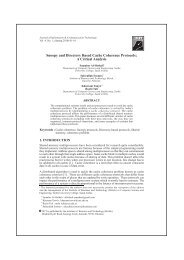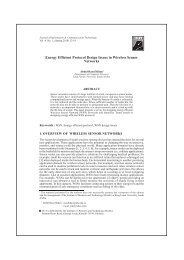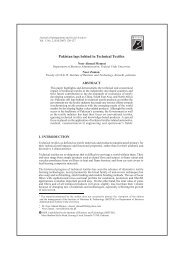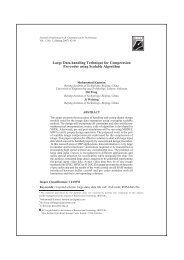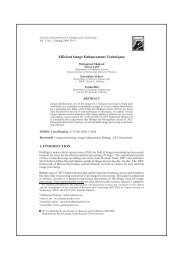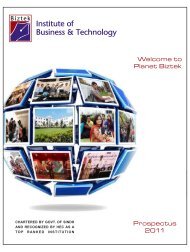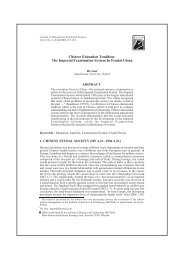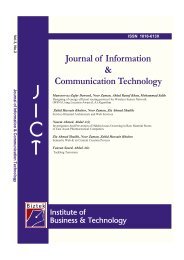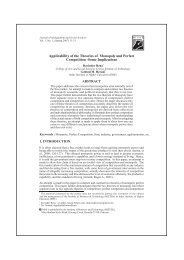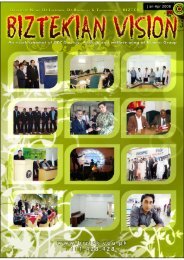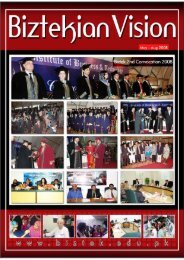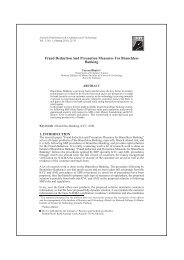State Reconstitution and the Challenge of Democracy in Somalia
State Reconstitution and the Challenge of Democracy in Somalia
State Reconstitution and the Challenge of Democracy in Somalia
You also want an ePaper? Increase the reach of your titles
YUMPU automatically turns print PDFs into web optimized ePapers that Google loves.
<strong>State</strong> <strong>Reconstitution</strong> <strong>and</strong> <strong>the</strong> <strong>Challenge</strong> <strong>of</strong> <strong>Democracy</strong> <strong>in</strong> <strong>Somalia</strong><br />
rhetoric <strong>the</strong> first is currently a term <strong>of</strong> abuse <strong>and</strong> <strong>the</strong> second <strong>of</strong> approbation (Lewis, 1998).<br />
While <strong>in</strong> o<strong>the</strong>r African states, <strong>the</strong> hydra-headed problem <strong>of</strong> ethnicity could be deciphered<br />
<strong>in</strong> most national <strong>and</strong> domestic problems. In <strong>Somalia</strong>, <strong>the</strong> society was structured traditionally<br />
as clan system. Therefore Clanism has always been a central pillar <strong>of</strong> <strong>the</strong> Somali traditional<br />
political life.<br />
Thus as Lewis has already stated<br />
“...Clanism is <strong>the</strong> Somali version <strong>of</strong> <strong>the</strong> generic problem <strong>of</strong> ethnicity or tribalism,<br />
social scientists with<strong>in</strong> Somali studies have long focused on an analysis or tribalism...”<br />
(Lewis, 1990)<br />
The above equally throws-up salient questions. For <strong>in</strong>stance, <strong>Somalia</strong> has over <strong>the</strong> years<br />
developed a strong sense <strong>of</strong> community life exemplified by a common language, a broadly<br />
homogeneous <strong>and</strong> largely pastoral culture <strong>and</strong> a thorough adherence to <strong>the</strong> tenets <strong>of</strong> Islam.<br />
Then why this condition <strong>of</strong> anarchy <strong>in</strong> which <strong>the</strong> state has found itself <strong>and</strong> from which it<br />
is still reel<strong>in</strong>g The social science literature is awash with all k<strong>in</strong>ds <strong>of</strong> propositions. The<br />
central concept or element which has become typical <strong>in</strong> highlight<strong>in</strong>g <strong>the</strong> <strong>Somalia</strong>n political<br />
system all through this literature is <strong>the</strong> importance <strong>of</strong> k<strong>in</strong>ship. Lewis argues that segmented<br />
clan system rema<strong>in</strong>s <strong>the</strong> bedrock or foundation, <strong>and</strong> 'clannishness' which he described as<br />
<strong>the</strong> primacy <strong>of</strong> clan <strong>in</strong>terest <strong>the</strong>n has <strong>the</strong> tendency <strong>of</strong> divid<strong>in</strong>g <strong>the</strong> society <strong>and</strong> creat<strong>in</strong>g a<br />
segmented social structure which <strong>in</strong> turn is a recipe for "<strong>in</strong>stitutionalized <strong>in</strong>stability"<br />
(Lewis,1961). In similar ve<strong>in</strong>, Samatar argues that <strong>the</strong> changes fostered on <strong>Somalia</strong>n<br />
traditional lifestyle like <strong>the</strong> partial commoditization <strong>of</strong> production <strong>and</strong> <strong>the</strong> confusion <strong>of</strong><br />
k<strong>in</strong>ship with clannishness have both done enough damage to <strong>Somalia</strong>'s existence as a<br />
nation (Samatar, 1988.) The transformation <strong>of</strong> social roles h<strong>and</strong>ed to <strong>the</strong> nor<strong>the</strong>rn Somalis<br />
which sought to alienate <strong>the</strong>m from <strong>the</strong>ir traditional role <strong>and</strong> which was exploited by<br />
lead<strong>in</strong>g politicians as well as <strong>the</strong> <strong>in</strong>telligentsia also played a part. (Samatar, 1989)<br />
The policies <strong>of</strong> Siad Barre <strong>in</strong> <strong>the</strong> nor<strong>the</strong>rn part <strong>of</strong> <strong>Somalia</strong> especially with <strong>the</strong> Isaaq clan<br />
where from 1978-1980 onwards, he <strong>in</strong>stigated widespread violence designed to punish <strong>the</strong><br />
people <strong>of</strong> this region have been well documented . As a result <strong>of</strong> this oppressive rule, <strong>the</strong><br />
people <strong>of</strong> this region mobilized <strong>in</strong>to groups. Before long violent revolts had engulfed <strong>the</strong><br />
north <strong>and</strong> subsequently spread down. By January 1991, Siad Barre had fled Mogadishu<br />
(Battera, 2004).<br />
Events after his departure had assumed such a horrible proportion. <strong>Somalia</strong> had experienced<br />
several peacekeep<strong>in</strong>g operations all supported by <strong>in</strong>ternational bodies. Notable among<br />
<strong>the</strong>se was <strong>the</strong> United Nation <strong>in</strong>tervention force nicknamed 'Operation Restore Hope' which<br />
was ma<strong>in</strong>ly an American peacekeep<strong>in</strong>g operation. The ironical angle to <strong>the</strong>se peacekeep<strong>in</strong>g<br />
operations is that all have ended <strong>in</strong> serious failures. Besides this, <strong>the</strong>y have all left <strong>Somalia</strong><br />
<strong>in</strong> an even more sorry state than before. It should be understood that <strong>Somalia</strong> because <strong>of</strong><br />
its traditional <strong>and</strong> cultural style is close to what could be described as a decentralized<br />
political set up. Its heavy reliance on clan <strong>and</strong> Clanism which organizes its agro-pastoral<br />
life <strong>and</strong> which provides <strong>the</strong> l<strong>in</strong>e <strong>of</strong> conflicts along which struggles for recognition have<br />
been fought is a testimony to this fact (Battera, 2004). In <strong>the</strong> same ve<strong>in</strong>, Lewis argues that<br />
<strong>the</strong> Somalis had lived under decentralized clan based politics which is <strong>of</strong>ten referred to<br />
as 'pastoral democracy'. Deriv<strong>in</strong>g from this is <strong>the</strong> relative peaceful co-existence fostered<br />
by decentralized governance. Therefore, it is important to identify two major livewires <strong>of</strong><br />
social existence which had tended to characterize <strong>Somalia</strong>. First is a h<strong>in</strong>terl<strong>and</strong> pastoral<br />
<strong>and</strong> agro-pastoral movement; second is <strong>the</strong> establishment <strong>of</strong> many coastal states which<br />
developed central adm<strong>in</strong>istrative <strong>and</strong> legal systems based strictly on Islamic law (Battera,<br />
2004).<br />
However, it must be noted that after <strong>the</strong> British Somali-l<strong>and</strong> <strong>and</strong> Italian <strong>Somalia</strong> were<br />
amalgamated <strong>in</strong> July 1 1960. The former came to <strong>in</strong>troduce what it called participatory<br />
democracy (<strong>the</strong> latter had completely lost out s<strong>in</strong>ce <strong>the</strong> outcome <strong>of</strong> its ventures <strong>in</strong> <strong>the</strong><br />
Vol. 5, No. 2, (Fall 2009)<br />
141


